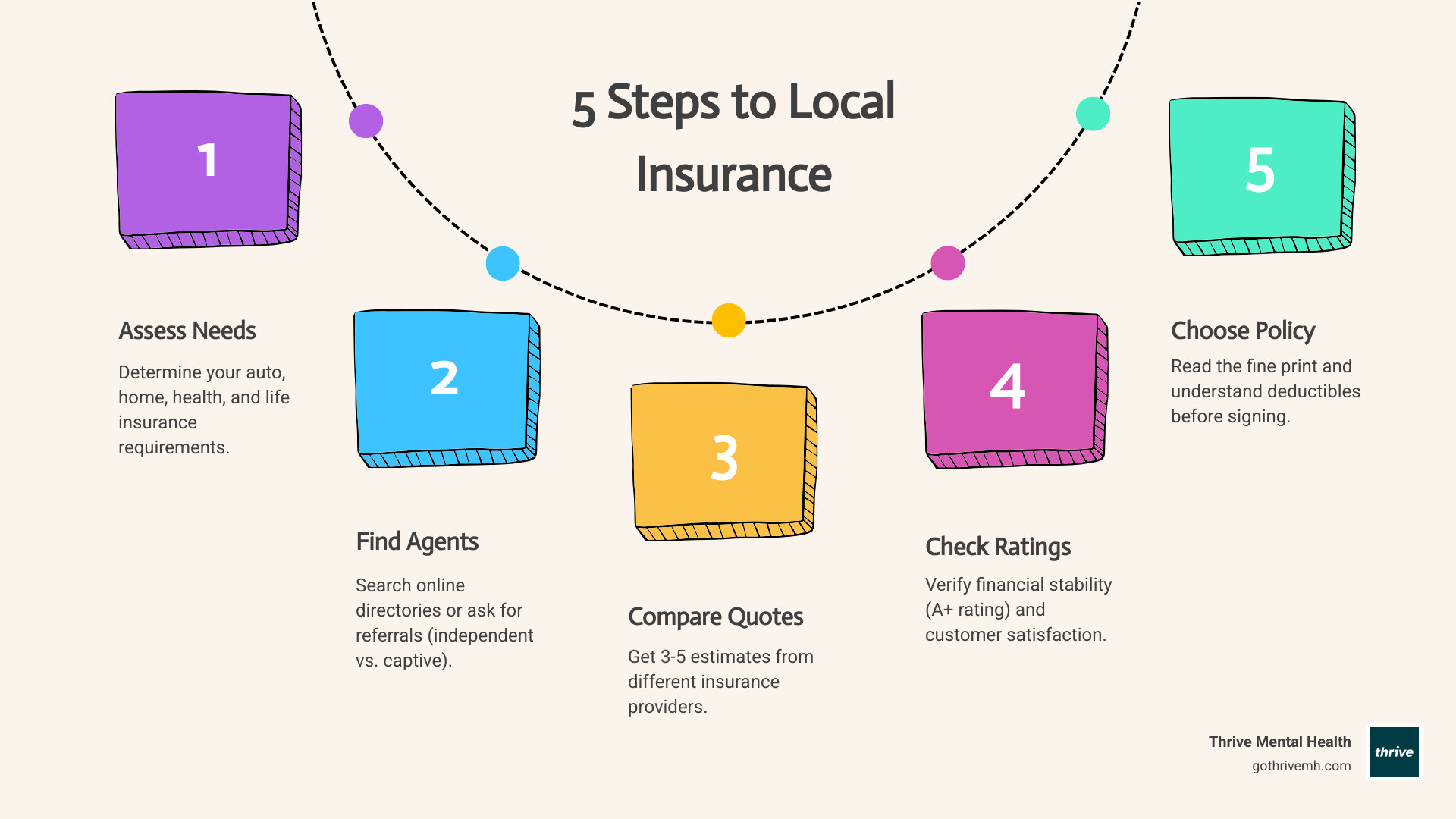Insurance Near Me Made Easy: Your Neighborhood Coverage Guide

Why Finding the Right Insurance Coverage Starts in Your Neighborhood
Insurance Near Me: 5 Steps to Cut Costs and Get Better Mental Health Coverage [2025]
Looking for insurance near me? This guide shows you exactly how to find local agents, compare real quotes, and make sure your health and mental health benefits actually work when you need them.
When searching for insurance near me, you’re looking for local agents and coverage options that protect what matters most to you. Here’s what you need to know right away:
Quick Steps to Find Local Insurance:
- Assess your needs – Auto, home, health, and life insurance basics
- Find local agents – Independent vs. captive agent options
- Compare quotes – Get 3-5 estimates from different providers
- Check ratings – Verify financial stability (A+ rating) and customer satisfaction
- Choose your policy – Read the fine print before signing
Finding insurance doesn’t have to feel overwhelming. Whether you need auto coverage after moving to a new city, homeowners insurance for your first house, or health insurance that covers mental health services, the right local agent can guide you through your options and help you save money through bundling discounts.
The real key is understanding that your health insurance – especially mental health coverage – often matters most. While you might save over $950 annually by bundling auto and home insurance, having access to quality mental health care can be life-changing when you’re dealing with anxiety, depression, or other challenges that affect your daily life.
At Thrive Mental Health, our licensed team works with major insurers and understands how the right coverage makes expert, evidence-based care accessible and affordable across Florida.

Insurance near me terms made easy:
First, Pinpoint Your Coverage Needs
Before you start searching for “insurance near me”, take a step back and figure out what you actually need. It’s like going grocery shopping without a list – you’ll end up with three bags of chips and forget the milk.
Most people need the basics: auto insurance if you drive (it’s the law in most states), homeowners or renters insurance to protect your stuff, and life insurance if anyone depends on your income. Your auto rates depend on everything from your car model to your age – a 21-year-old driving a sports car will pay way more than a 47-year-old with a sensible sedan.
But here’s where things get personal: health insurance isn’t just another item on your coverage checklist. It’s your lifeline when life throws you curveballs. And increasingly, people are recognizing that mental health coverage deserves just as much attention as coverage for broken bones or heart surgery.
If you’re starting from scratch with health coverage, our guide on How to Get Health Insurance walks you through the whole process. The key is finding a plan that doesn’t just cover emergencies, but also gives you access to mental health services when you need support for anxiety, depression, or life’s everyday stressors.
Why Your Health and Mental Health Insurance Matters Most
Here’s the thing about health insurance – having a card in your wallet isn’t enough. You need to understand how to actually use it without getting hit with surprise bills.
In-network vs. out-of-network is probably the most important concept to grasp. In-network providers have agreements with your insurance company, which means lower costs for you. Go out-of-network, and you might pay the full price upfront and hope for reimbursement later.
Copays are your fixed cost per visit – maybe $15-25 for therapy with most major insurers, or sometimes as low as $0 with certain Medicare or TRICARE plans. Deductibles are what you pay each year before your insurance kicks in.
Finding a therapist who takes your insurance used to feel like searching for a needle in a haystack. Our article Medical Insurance Cover Therapy breaks down exactly how to steer this process. Pro tip: always call your insurance company directly to verify coverage, even if a therapist says they’re in-network.
The good news? Mental health coverage has come a long way. Most insurance plans now cover individual therapy, group sessions, family counseling, medication management, virtual therapy sessions, and even intensive programs like Intensive Outpatient Programs (IOP) and Partial Hospitalization Programs (PHP).
These intensive programs are game-changers for people who need more support than weekly therapy but don’t require inpatient treatment. At Thrive, we offer both virtual and in-person IOP and PHP programs that work with major insurance providers. Explore our Intensive Outpatient Program (IOP) and Partial Hospitalization Program (PHP), and if you want to confirm what your plan covers, you can Start benefits check in about 2 minutes.
The bottom line? Your mental health coverage might be the most valuable part of your entire insurance portfolio – and it’s often more accessible than you think.
Your Step-by-Step Guide to Finding Insurance Near Me
Once you’ve figured out what coverage you need, it’s time to actually find the right providers in your area. The good news? Insurance near me searches have never been easier thanks to modern tools and resources.
Start with online search tools – they’re your best friend here. A simple Google search for “auto insurance near me” or “home insurance agents Miami” will give you a solid starting point. Most major providers like State Farm and GEICO have handy agent locators right on their websites, so you can find someone local without much hassle.
Local business directories can be goldmines for finding agents with real customer feedback. Websites like Yelp and Facebook often list local agencies complete with reviews and contact info. Even LinkedIn can help – try searching for something like “insurance agent Orlando” to find professionals in your area.
But here’s something that never goes out of style: asking for referrals. Your friends, family, and coworkers are probably your most trusted source. They’ve been through the claims process, dealt with customer service, and can tell you honestly whether their agent really showed up when it mattered.
Once you have a list of potential providers, don’t just pick the first one. Vetting providers is crucial for your peace of mind. Look for customer satisfaction ratings – companies with 97% customer satisfaction ratings (like GEICO) tend to deliver better experiences. Financial stability ratings matter too – you want an insurer that’ll be around to pay claims. Look for A+ ratings from AM Best, which shows the company can meet its obligations to policyholders.
For an extra layer of protection, check out FINRA’s BrokerCheck to verify that agents and brokers are properly licensed. It’s a free tool that can save you from potential headaches down the road.
Independent vs. Captive Agents: What’s the Difference for You?
When you’re searching for insurance near me, you’ll run into two main types of agents, and understanding the difference can save you both time and money.
Independent agents work with multiple insurance companies, which means they can shop around for you. Think of them as your personal comparison shopper – they’ll gather multiple quotes from different providers and present you with options. Their loyalty is to finding you the best deal, not to any particular company. This approach often leads to better rates and coverage that’s truly custom to your situation.
Captive agents, on the other hand, work exclusively for one insurance company. While they can’t shop around, they offer brand-specific expertise that can be incredibly valuable. They know their company’s products inside and out, understand the claims process thoroughly, and can build long-term relationships with their clients.
How to find an independent insurance agent near me is pretty straightforward. Search online for “independent insurance agent [your city]” and look for agencies that list multiple insurance companies on their websites. Many independent agents will proudly display the logos of all the companies they represent.
Choosing the right fit for your needs depends on your preferences. If you want variety and don’t mind doing a bit more research, an independent agent gives you options. If you prefer having one trusted contact who knows you and your situation well, a captive agent might be perfect.
Finding a Local Agent in Florida
Since we serve clients across Florida, we understand how important local expertise can be. State-specific considerations really matter when it comes to insurance. Florida agents need to understand hurricane and flood coverage, which are critical risks in the Sunshine State.
Finding an agent in a major Florida city like Jacksonville or Tampa means looking for someone who understands these local market trends. In Florida, you’ll find agents who understand the specific weather patterns, coastal risks, and regional pricing that affect your premiums.
Here are some questions to ask a potential agent when you’re vetting them:
What experience do you have with clients in my specific area? How familiar are you with the common risks we face locally? Can you walk me through the claims process step by step? How often will you review my policy to make sure it still fits my needs?
The right local agent becomes more than just someone who sells you a policy – they become a trusted advisor who understands your community and can guide you through both routine updates and major life changes.
Open uping Savings: What Really Affects Your Insurance Premiums?
When you’re searching for insurance near me, understanding what drives your costs can save you hundreds—or even thousands—of dollars each year. Your premium isn’t just a random number; it’s calculated based on specific risk factors that insurance companies have refined over decades of data.
Location matters more than you might think. Your ZIP code alone can dramatically impact what you pay. If you live in a dense urban area like Miami, your auto insurance will likely cost more than the same coverage in a smaller Florida town due to higher traffic and accident rates. Similarly, Florida residents often face higher homeowners premiums because of risks like hurricanes and flooding, especially in coastal areas.
Your personal profile plays a huge role too. Age is a major factor—a 22-year-old driver typically pays significantly more than a 46-year-old with the same coverage. Your driving record acts like a report card for insurers. A clean history with no accidents or tickets consistently leads to lower premiums, while incidents like DUI convictions can skyrocket your rates for years.
Credit history might surprise you as a pricing factor, but in most states, insurers use your credit score as an indicator of responsibility. They’ve found that people who manage credit well tend to file fewer claims.
The type of property or vehicle you’re insuring makes a difference too. A Toyota Camry costs less to insure than a Mercedes-Benz AMG, just like a newer home with safety features costs less than an older one without modern protections.
Here’s where the real savings kick in: bundling policies can save you over $950 annually when you combine auto and home insurance with the same provider. This isn’t just marketing hype—it’s one of the most reliable ways to cut your insurance costs significantly.

How to Save with Major Insurance Providers
Smart shoppers know that discounts can make or break a good deal. When you’re comparing insurance near me options, always ask about these money-saving opportunities.
Bundling discounts top the list for good reason. Combining your auto and home policies with one provider often delivers the biggest savings—sometimes over $950 per year. Most major insurers offer this discount because they want your complete business, not just part of it.
Good student discounts can help families with young drivers. If you have a teen or college student maintaining a B average or better, many insurers will reduce their premiums. It’s their way of rewarding responsible behavior that often translates to safer driving.
Safe driver programs use technology to monitor your actual driving habits—how fast you drive, how hard you brake, and how many miles you put on annually. If you’re a careful driver, these telematics programs can significantly reduce your rates.
Your vehicle’s safety features matter too. Cars with anti-lock brakes, multiple airbags, and anti-theft systems often qualify for discounts. Similarly, homes with smoke detectors, security systems, and impact-resistant roofs can reduce your homeowners premiums.
When it comes to health insurance, understanding coverage from providers like Cigna, Optum, and Florida Blue becomes crucial for accessing mental health services. Many of these major providers now offer comprehensive mental health benefits, sometimes with $0 copays for therapy sessions. Our guide on Exploring Mental Health Resources with Cigna and UnitedHealthcare breaks down exactly what these plans cover and how to maximize your benefits.
The key is asking the right questions and being honest about your situation. Insurance agents want to find you savings—it keeps you as a customer and often earns them better commissions from satisfied clients.
Comparing Quotes & Making Your Final Choice
Now comes the exciting part – you’ve gathered your quotes, and it’s time to make sense of them all. Think of this like shopping for the perfect pair of jeans. You wouldn’t just grab the cheapest pair without checking if they fit well, right? The same logic applies when you’re comparing insurance near me options.
Start by gathering at least three to five quotes from different providers. This gives you a realistic picture of what coverage should cost in your area. But here’s where many people make a costly mistake – they focus only on the premium price without understanding what they’re actually buying.
When comparing quotes, you need to ensure you’re looking at comparable coverage limits and deductibles. That lower premium might seem attractive until you realize it comes with a $2,000 deductible instead of the $500 deductible from a slightly more expensive option. Ask yourself: can you comfortably afford that higher deductible if something happens?
Coverage limits are equally important – this is the maximum amount your insurance company will pay for a covered loss. If you own a $300,000 home, you don’t want coverage that only goes up to $200,000. Make sure these limits actually protect your assets, not just meet the minimum requirements.

Reading the fine print isn’t the most thrilling part of your day, but it’s crucial. Pay special attention to policy exclusions – these are the situations your policy won’t cover. For example, standard homeowners insurance typically excludes flood damage, which means you’d need separate flood insurance. Understanding these gaps now prevents nasty surprises later.
This attention to detail becomes even more critical with health insurance. When comparing mental health coverage options, look beyond just the premium. Check if your preferred therapists are in-network, understand your copay structure, and verify that services like intensive outpatient programs are covered if you might need them.
Before You Sign: A Final Checklist
You’re almost at the finish line, but don’t rush this final step. Taking a few extra minutes now can save you headaches (and money) down the road.
First, verify your agent’s credentials. Use resources like FINRA’s BrokerCheck or your state’s Department of Insurance website to confirm they’re properly licensed. It takes two minutes and gives you peace of mind that you’re working with a legitimate professional.
Next, dive into customer reviews beyond what’s on the agent’s website. Check Google reviews, Yelp, or other independent sites to see what real customers say about their experience. Look for patterns – if multiple people mention slow claim processing or poor communication, that’s valuable information.
Understanding the claims process before you need it is smart planning. Ask your agent to walk you through exactly what happens when you file a claim. How quickly do they typically respond? What documentation do you need? Many companies now offer streamlined online claim filing – Liberty Mutual, for example, provides clear online portals where you can easily report and track claims.
Finally, confirm your payment options and understand the billing cycle. Most insurers offer convenient online payment portals or mobile apps to pay your bill automatically. Setting up autopay can often earn you a small discount and ensures you never miss a payment.
For health insurance specifically, double-check that your current doctors and any mental health providers you’re seeing are in-network with your new plan. If you’re currently in therapy or considering it, verify that services are covered before switching plans. The last thing you want is to interrupt important mental health care due to insurance complications.
Once you’ve completed this checklist, you can sign with confidence, knowing you’ve made an informed decision that truly protects what matters most to you.
Frequently Asked Questions about Finding Local Insurance
When you’re searching for insurance near me, the same questions come up again and again. I’ve helped countless people steer these waters, and honestly, the confusion is completely understandable. Insurance can feel like learning a foreign language while blindfolded.
Let me walk you through the most common concerns people have when looking for local coverage.
How can I find the cheapest insurance near me?
Finding affordable insurance isn’t just about grabbing the lowest number you see – it’s about being strategic. Start by comparing quotes from multiple providers because rates can vary dramatically between companies for the exact same coverage.
Here’s what actually moves the needle on price: bundling your policies (like combining home and auto) can save you serious money – we’re talking over $950 annually in many cases. Your credit score matters more than you’d think – insurance companies use it to predict how likely you are to file claims, so keeping it healthy helps your premiums.
Working with an independent agent is often your secret weapon here. They’re not tied to one company, so they can actually shop around for you instead of just trying to sell you whatever they have. It’s like having a personal shopper for insurance.
What is the easiest way to get insurance?
The path of least resistance? Use an online comparison tool or contact an independent insurance agent. Think about it – would you rather spend your Saturday calling eight different companies and repeating your information eight times, or have one person do that legwork for you?
Independent agents can gather your details once and come back with several quotes. Many providers also offer quick online quotes now, which is perfect if you’re the type who likes to research at 11 PM in your pajamas.
For health insurance specifically, including mental health coverage, many companies now have streamlined online processes. At Thrive, we can even help you verify your insurance benefits in about 2 minutes with no obligation – because nobody should have to decode insurance benefits alone.
What types of insurance should I have?
This depends on your life situation, but there are some non-negotiables. Auto insurance is legally required if you drive – not optional, not negotiable. Home or renters insurance protects your stuff and covers you if someone gets hurt at your place (yes, even renters need this).
Health insurance is absolutely critical, and I can’t stress this enough – make sure it includes mental health coverage. Life has a way of throwing curveballs, and having access to therapy or intensive programs when you need them can be life-changing.
Beyond the basics, you might consider life insurance if people depend on your income, disability insurance to replace your paycheck if you can’t work, and pet insurance if your furry family members are important to you (vet bills can get expensive fast).
How do I know if an insurance company is reputable?
Nobody wants to pay premiums for years only to have their insurance company disappear when they need them most. Check their financial stability ratings from AM Best – you want to see A+ or higher, which means they have the financial strength to pay claims.
Customer satisfaction scores from J.D. Power tell you how well they treat people during the claims process. Because let’s be honest, that’s when you really find out what kind of company you’re dealing with.
Read online reviews and check your state’s department of insurance for complaint records. A few complaints are normal for any large company, but patterns of poor service or delayed payments are red flags you shouldn’t ignore.
Ready for support? Thrive offers virtual and hybrid IOP/PHP with evening options. Verify your insurance in 2 minutes (no obligation) → Start benefits check or call 561-203-6085. If you’re in crisis, call/text 988.
Take Control of Your Coverage
Finding the right insurance near me is about more than just hunting for the lowest premium – it’s about creating a safety net that gives you genuine peace of mind. When life throws you curveballs, whether it’s a fender bender, a medical emergency, or a mental health crisis, the right coverage becomes your financial lifeline.
Think of insurance as your personal security team. Your auto and home policies protect your physical assets, while your health insurance – especially mental health coverage – protects something far more valuable: your wellbeing and ability to thrive. We’ve seen how the right insurance plan can transform someone’s access to care, making the difference between struggling alone and getting the support they need.
Your mental health coverage deserves special attention. Unlike a car accident that happens once, mental health challenges often require ongoing support. Whether you’re dealing with anxiety, depression, or life transitions, having robust mental health benefits means you can access evidence-based treatments like intensive outpatient programs without breaking the bank.
The insurance landscape might seem complex, but you now have the roadmap. Start by assessing your actual needs – not what someone else thinks you need. Shop around with multiple agents, especially independent ones who can show you options from different companies. Compare those quotes carefully, looking beyond just the price to understand what you’re actually getting. And finally, verify everything before you sign on the dotted line.
The cheapest policy isn’t always the smartest choice. A plan that saves you $50 a month but leaves you with a $5,000 deductible for mental health services might not serve you well when you actually need care. Balance cost with coverage – your future self will thank you.
Ready for support? Thrive offers virtual and hybrid IOP/PHP with evening options. Verify your insurance in 2 minutes (no obligation) → Start benefits check or call 561-203-6085. If you’re in crisis, call/text 988.